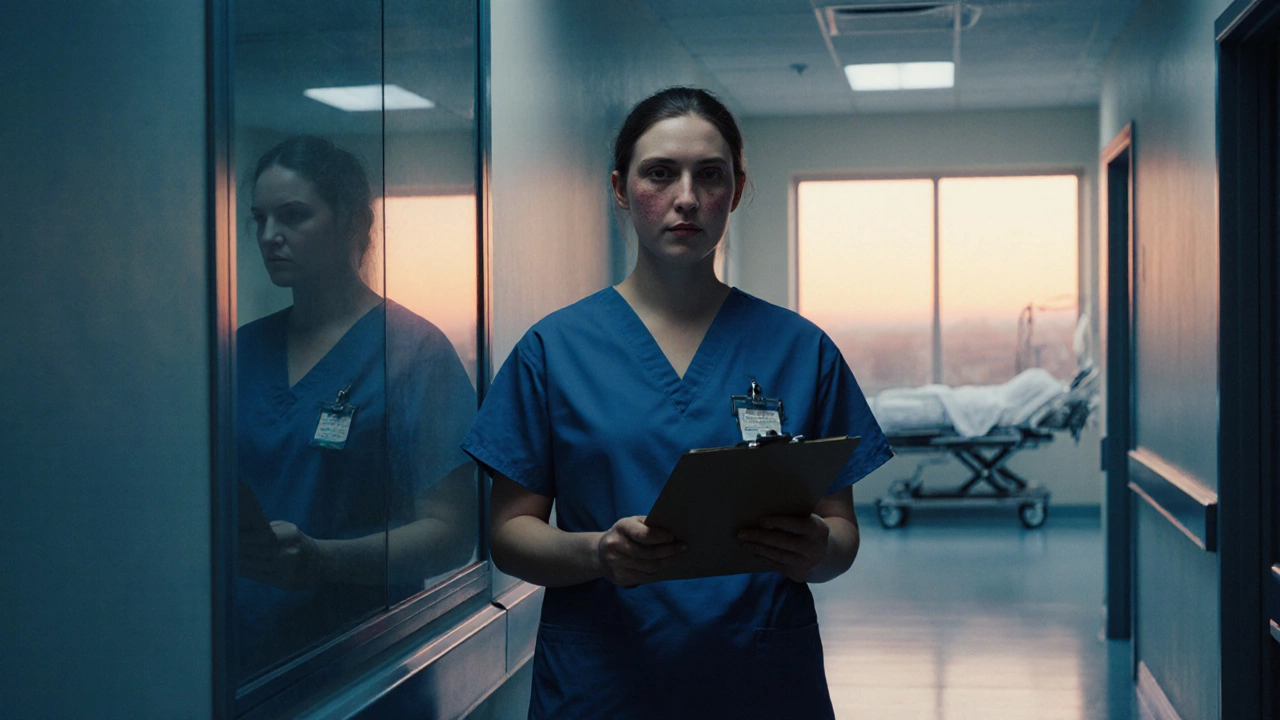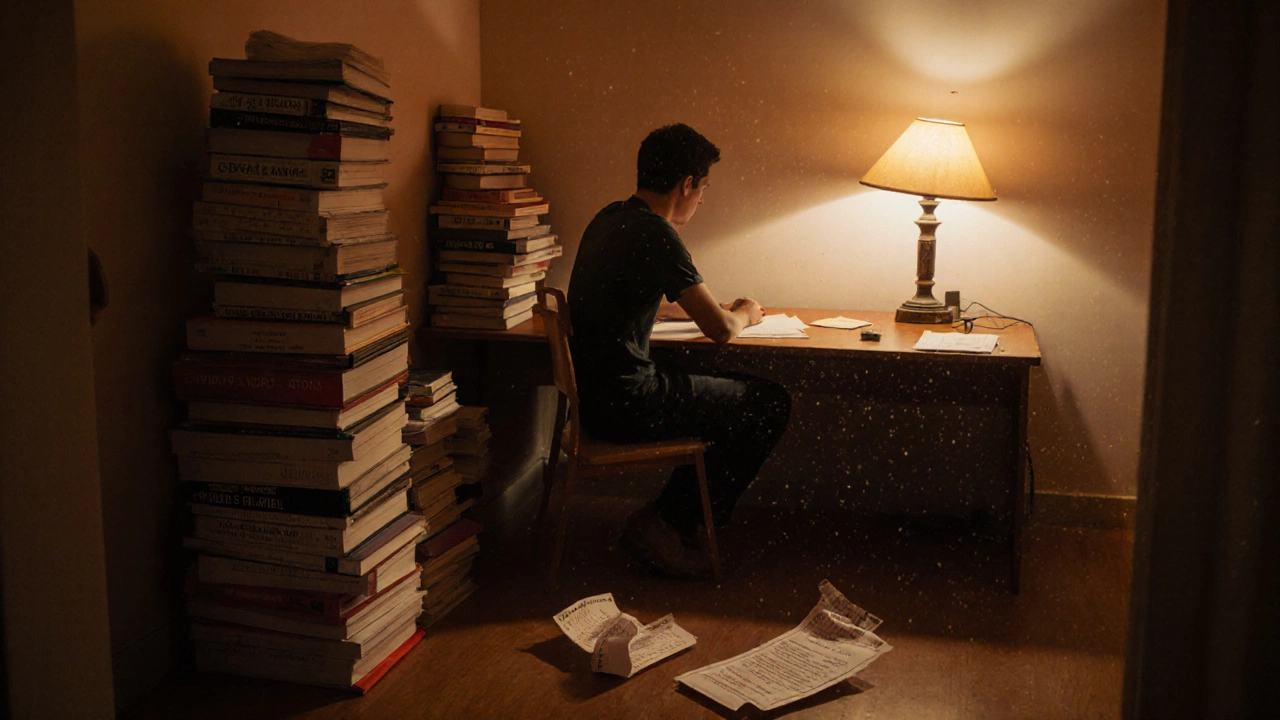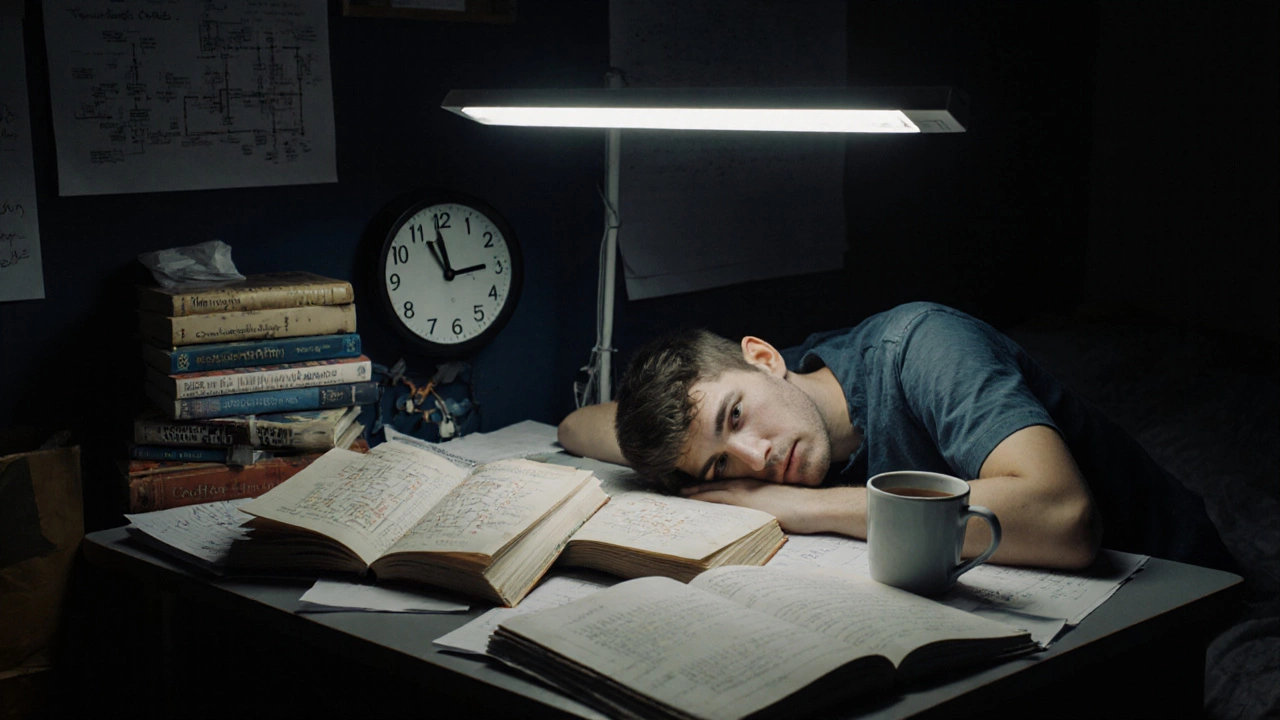Degree Difficulty Estimator
Your Academic Profile
Difficulty Assessment
When people ask which degree is the toughest in India, they’re not just talking about exams. They’re asking about years of sleepless nights, 12-hour study days, and mental burnout that feels endless. The answer isn’t one single degree-it’s a mix of structure, pressure, and stakes that no other system in the world matches. If you’ve grown up under the CBSE syllabus, you already know what pressure feels like. But college? That’s a whole different level.
Engineering: The CBSE Grind Doesn’t Prepare You for This
Engineering, especially from top IITs, is brutal-not because the subjects are impossibly hard, but because the pace doesn’t stop. You start with calculus, physics, and chemistry in Class 12 under CBSE. That’s the baseline. In college, you’re expected to master thermodynamics, data structures, and circuit analysis while solving 15 problems a day. The syllabus doesn’t change much from year to year, but the expectations do. One student from IIT Delhi told me he studied 16 hours a day during finals. Not because he wanted to, but because failing one subject meant delaying graduation by a full year.
And it’s not just the workload. The competition is insane. In 2024, over 1.5 million students took JEE Advanced. Only 12,000 got into IITs. That’s less than 1%. If you’re not in the top 1%, you’re not even in the running for the best programs. The pressure doesn’t come from the material-it comes from the fear of falling behind.
Medicine: The Longest Hurdle Race
MBBS is the longest degree in India-5.5 years minimum, and that’s only the start. After that, you need another 3 years for MD or MS if you want to specialize. The NEET exam is the gatekeeper. Over 2.3 million students took NEET in 2024. Only 100,000 got seats. And those seats? Mostly in government colleges, where fees are low but competition is fiercer than ever.
The real challenge isn’t memorizing anatomy or pharmacology. It’s the emotional toll. Medical students start seeing dead bodies in their first year. They work 36-hour shifts by their third year. They’re on call during festivals. They miss birthdays. One student from AIIMS Delhi said she cried every Sunday night because she knew Monday meant another 18-hour shift. And there’s no escape. Unlike engineering, where you can switch jobs or go abroad, medicine in India is a lifelong commitment. You can’t quit halfway.
Chartered Accountancy: The Paper Monster
CA is not a degree. It’s a gauntlet. The Institute of Chartered Accountants of India (ICAI) runs three levels: Foundation, Intermediate (IPCC), and Final. Each level has 6-8 papers. You need 40% in each paper and 50% overall to pass. No grace marks. No re-evaluation. If you get 39% in one subject, you fail the whole group-even if you scored 90% in the others.
Pass rates? Around 15% for Intermediate. 8-10% for Final. That’s not a test. That’s a filter. Students often take 5-7 years to clear all levels. Many drop out after failing twice. The syllabus is massive-accounting, auditing, taxation, law, cost management, and information technology. And it changes every year. One student from Mumbai studied 14 hours a day for 18 months and still failed Final Group 2 twice. He said, “I knew every rule. But the exam doesn’t test knowledge-it tests endurance.”

Company Secretary: The Hidden Beast
Not many talk about Company Secretary (CS), but it’s just as tough. The Institute of Company Secretaries of India (ICSI) has three stages: Foundation, Executive, and Professional. Each stage has 7-8 papers. The subjects? Corporate law, secretarial practice, taxation, compliance, and governance. It’s not just about memorizing laws-it’s about applying them in real cases. The pass rate? 10-12% overall.
What makes CS harder than CA? You’re expected to know everything. A CA can specialize in audit or tax. A CS has to be an expert in law, finance, compliance, and corporate strategy. And there’s no backup plan. If you fail one paper, you can’t move forward. Many students work full-time while studying because internships are unpaid. One CS professional from Hyderabad told me she studied from 6 AM to 11 PM for two years, slept 4 hours a night, and still failed her final exam twice. She passed on the third try. “I didn’t want to be the person who gave up,” she said.
Why CBSE Makes It Harder
The CBSE syllabus trains students to memorize, not think. In Class 12, you’re taught to write answers in a fixed format. “Define, explain, give example.” That works for board exams. It doesn’t work for college. In engineering, you need to solve problems you’ve never seen before. In medicine, you need to diagnose based on symptoms, not textbook cases. In CA and CS, you need to interpret laws that change every year.
CBSE doesn’t teach critical thinking. It teaches test-taking. So when students enter college, they’re not ready. They’ve spent 12 years learning how to pass exams. Now they have to learn how to survive them. That’s why dropout rates are so high. It’s not that the degrees are impossible. It’s that the system doesn’t prepare you for what’s coming.
What No One Tells You
There’s no official ranking of the toughest degree in India. But if you look at pass rates, study hours, dropout numbers, and mental health reports, three stand out: Engineering (IIT), Medicine (AIIMS), and Chartered Accountancy.
Engineering is tough because of the speed. Medicine is tough because of the length. CA is tough because of the precision.
And here’s the truth: the toughest degree isn’t the one with the hardest syllabus. It’s the one that takes your identity. You stop being a student. You become a machine. You stop hanging out with friends. You stop watching movies. You stop sleeping. And when you finally pass, you don’t feel proud-you just feel empty.

Who Should Even Try?
If you’re asking this question because you’re scared, you’re already in the right place. The people who succeed aren’t the smartest. They’re the ones who show up every day, even when they’re exhausted. They don’t wait for motivation. They build routines. They sleep 6 hours, not 4. They take Sundays off. They talk to counselors. They admit when they’re overwhelmed.
If you’re thinking of taking on one of these degrees, don’t do it because your parents want you to. Don’t do it because it’s “prestigious.” Do it because you can’t imagine doing anything else. Because if you can’t live without it, then you’ll find a way.
What Comes After?
Passing one of these degrees doesn’t mean the stress ends. Engineers face job cuts. Doctors face hospital politics. CAs face client pressure. CS professionals face regulatory audits. But here’s the flip side: those who make it? They’re respected. They earn well. They get opportunities abroad. They become leaders.
It’s not about being the toughest. It’s about being the one who didn’t quit.
Is CA tougher than engineering in India?
It depends on what you mean by tough. Engineering has a higher workload and faster pace, especially in IITs. CA has lower pass rates-only 8-10% clear the Final level. Engineering tests problem-solving under pressure. CA tests precision under uncertainty. Many students find CA harder because failing one paper means retaking the whole group, even if you aced the rest.
Why is NEET considered harder than JEE?
NEET has more applicants-over 2.3 million in 2024-compared to JEE Advanced’s 1.5 million. But the real difference is the stakes. JEE gives you a choice: you can go to NITs, IIITs, or private colleges if you miss IIT. NEET gives you one path: government medical colleges. If you don’t get a seat, you either retake the exam or abandon medicine. That pressure makes NEET feel harder, even if the syllabus is slightly easier than JEE.
Can you clear CA in 3 years?
It’s possible, but rare. The minimum time is 3 years if you clear all exams on first attempt and complete articleship without delays. But most students take 5-7 years. The Intermediate level has a 15% pass rate. Final has 8-10%. Many fail one or two papers and have to retake entire groups. Only 1 in 10 students clear CA in under 4 years.
Is MBBS harder than CA?
MBBS is longer and more emotionally draining. CA is more mentally rigid. MBBS requires 5.5 years of study, then 3 more for specialization. CA requires 3-7 years to clear exams, plus 2-3 years of articleship. MBBS students face death, trauma, and long shifts. CAs face legal complexity and constant syllabus changes. Neither is easier. MBBS breaks your body. CA breaks your patience.
Do CBSE students have an advantage in these degrees?
CBSE gives you a strong foundation in math and science, which helps in engineering and medicine. But it doesn’t prepare you for the independence college demands. CBSE teaches you to memorize. College teaches you to apply. Many CBSE toppers struggle in college because they’ve never learned how to think on their own. The real advantage isn’t the syllabus-it’s the discipline.
Final Thought
The toughest degree in India isn’t about the subject. It’s about the system. It’s about being told from age 10 that your worth is tied to your marks. It’s about parents who say, “Only doctors and engineers are successful.” It’s about a society that doesn’t value failure. If you’re still reading this, you’re already stronger than most. You didn’t quit. You kept asking questions. That’s the first step to surviving whatever comes next.
